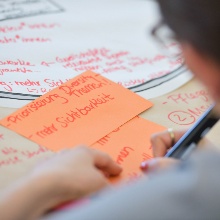The university is particularly predestined for diversity, explains Professor Ressel, Rector at the University of Stuttgart: "A university is an international environment, and everyone is welcome, regardless of religion, gender, or orientation. We want to stay young and enjoy the benefits of diversity."
Dr. Isabell Lisberg-Haag is the external auditor of the diversity auditing process "Shaping Diversity", which is sponsored by the Baden-Württemberg Foundation. She moderated the morning and made sure that everyone felt welcome. At the same time, it became clear that this is not an "all-embracing feel-good issue." Her questions were not easy: When asked about the financial incentives, Rector Ressel countered "Diversity is more than money - it's an attitude." He sees the university as having an obligation to do the appropriate "brainwork" and to consider how, for example, women in society can be persuaded to study. This is because student numbers are declining and the proportion of women among students at the University of Stuttgart is only around 35 percent.
Discussions at the World Café
After a keynote presentation on "Inclusive Data Collection" by Dr. Jörg Dollmann, the work began for all participants. Following the "World Café" workshop method, all participants were allocated a discussion table. For example, one table discussed inclusive university culture, another considered how to establish a sustainable welcoming culture, and yet another focused on "diversity and digitalization". On the topic of "diversity-sensitive teaching," for example, the mixed classroom method was addressed. This method builds on the differences of all those present and views these as enriching the learning experience.
People around the table agree that "Learners need a safe environment to learn". Jaana Espenlaub from arbeiterkind.de calls on all teachers to be more sensitive to differences among learners.
At the "Diversity and Data" table, table host Beate Langer, head of the Gender Equality Office, reported that so far only data on gender and disability has been collected. There was a lively discussion at this table about whether it is more important to make differences quantifiable, or whether it is better in terms of equal opportunities (for example, in an appointment procedure) to collect as little data as possible.
The softly-softly approach does not instigate change
Next door, at the "Discrimination-Aware Administration" table, Barbara Scheubert, Diversity Management Officer and organizer of the event, called for an open climate and tolerance of error. The question is, how can such an atmosphere be created? Again, the issue of how to make marginalized groups more visible was raised. When it comes to the topic of "diversity networks", it quickly became clear that there are already numerous people involved in this topic at the University of Stuttgart, but that they need to establish a better network. "Creating awareness" was not only a hot-topic at the table "Do I belong?" - where the attention was drawn to being aware of one's own prejudices (in order to be able to combat them), and of privileges that are taken for granted. The changes necessary for more diversity cannot be achieved with the softly-softly approach - "We need a culture of debate!" was how Manuela Schlummer-Held, Gender Consultant, summarized a frequently mentioned wish from the "Where Can I Encounter Diversity?" table.
Maximum commitment
In the final round, the participants agreed that there was good cooperation across all levels. Student Marie Juliane Stamma was impressed by how many people are already involved in this topic, and how many ideas already exist but are currently not widely known. Or, to put it positively: "The nicest thing today was that I got to meet a lot of new people!", says Sannah König from Makerspace. This is one of the work assignments that arose from Diversity Day: Better networking and improved visibility of existing projects and offers.
A special highlight was the graphic recording by Jai Wanigesinghe. In this recording recording, for example, you see two university buildings in conversation: "What do you do to stay so young and open-minded?" - "I practice gender and diversity every day!"
Prof. Dr. Silke Wieprecht, the Vice Rector for Diversity and Internationalization and host of the event, was enthusiastic about the participants, "Maximum commitment" was tangible, she enthused. She would like everyone to feel responsible for ensuring diversity. "Every voice counts!" Diversity not only has predictable benefits, but also its own very special charm."
This charm was visible on Diversity Day at the University of Stuttgart. The event was well attended, colorful and lively. And the commitment continued: The steering committee met internally in the afternoon to develop the topics that had been worked on in the morning.
Feedback is not only needed on Diversity Day, but on an ongoing basis! Anyone who would like to get involved can email diversity@uni-stuttgart.de. Because diversity is only truly diverse when lots of people participate.


















